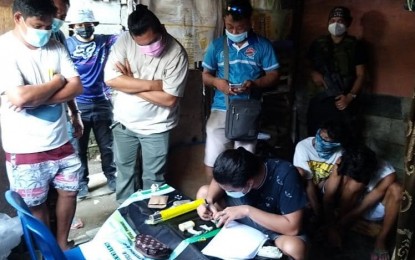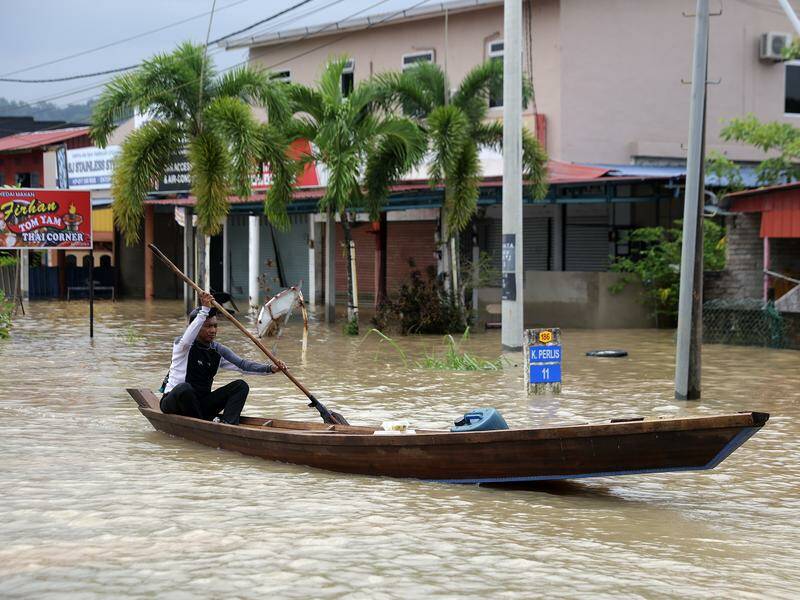More in Economy

18-Year-Old Suspect Arrested in Negros Occidental Buy-Bust Operation
An 18-year-old male suspect, known by the alias "Inggo," was apprehended in a buy-bust operation conducted by the Police Regional Office Negros Island Region (PRO-NIR) on Wednesday in Hacienda Carmenchica, Barangay Don Salvador Benedicto, Pontevedra, Negros Occidental. The suspect, who is currently unemployed and resides on 2nd Street in the barangay, was caught in possession of nine sachets of suspected methamphetamine (shabu) weighing approximately 25 grams. The street value of the confiscated drugs is estimated at P170,000. The arrest followed a tip-off from a confidential informant indicating that the suspect was actively involved in the illegal drug trade within the locality. Police operatives conducted surveillance to verify the information and subsequently executed the buy-bust operation upon confirmation of the suspect's activities in the area. In a statement, PRO-NIR emphasized, "This successful operation once again demonstrates the firm and consistent stand of PRO NIR in its fight against illegal drugs. With every arrest and every recovery, PRO NIR sends a clear message that illegal drug activities will never be tolerated in Negros Island." The seized drug evidence has been forwarded to the Negros Occidental Police Provincial Forensic Unit for laboratory analysis. Meanwhile, the arrested individual remains in custody at the Pontevedra Municipal Police Station pending proper legal proceedings.
Economy
|2 min read

Cebu NGOs Join Archbishop Uy’s Call for a Simple and Compassionate Christmas
In response to recent catastrophic disasters impacting Cebu and surrounding communities, two Cebu-based organizations have aligned themselves with Archbishop Alberto Uy’s call for a simple and meaningful Christmas celebration in 2025. The Action for Nurturing Children and Environment (ANCE), dedicated to child development and environmental stewardship, and the EcoWaste Coalition, an environmental network advocating for zero waste and toxics-free living, are emphasizing simplicity, compassion, and solidarity during the holiday season. Archbishop Uy issued a pastoral appeal on November 24, encouraging the faithful to celebrate Christmas with "greater simplicity, deeper compassion, and more intentional solidarity with the poor." This call comes amid the widespread destruction caused by recent earthquakes and floods that devastated homes, churches, and livelihoods. Rhoy L. Dizon, Executive Director of ANCE, expressed full support for the Archbishop’s message, stating, \"As a community-based NGO here in Cebu, we are deeply aware of the hardships faced by millions of our fellow citizens due to these tragic calamities. We stand with Archbishop Uy in urging everyone to embrace simplicity this Christmas to bring hope and cheer to disaster-affected families.\" Echoing this sentiment, Aileen Lucero, National Coordinator of the EcoWaste Coalition, emphasized the urgency of the appeal: \"As survivors strive to rebuild their lives, refraining from excessive consumerism honors the true spirit of Christmas and helps reduce trash generation during the festivities. It also allows us to provide meaningful support to those in need.\" The EcoWaste Coalition had previously advocated for a modest and eco-friendly holiday season, urging the reuse of decorations, simple celebrations, and caution against spending on fireworks and other polluting activities. The funds saved through these measures could be redirected to uplift the needy during the season of giving. Archbishop Uy further advised parishes, communities, and families to avoid extravagant displays, loud fireworks, and wasteful consumption. Instead, he called for gatherings centered on gratitude, prayer, and togetherness. \"Let our homes shine not with lights but with love. Let our parishes be filled not with noise but with prayer. Let our celebrations focus not on abundance but on presence—God’s presence and each other’s presence,\" he said. Concluding his appeal, the Archbishop expressed hope that these simple observances would bring profound joy, healing, and true reverence for the birth of Christ during this challenging season.
Economy
|2 min read

Independent Commission for Infrastructure Limits Public Access with Executive Sessions Despite Livestreaming Policy
The Independent Commission for Infrastructure (ICI) recently issued guidelines mandating the livestreaming of all its hearings. However, multiple invited lawmakers have chosen to hold their appearances behind closed doors through executive sessions, effectively circumventing public access to these proceedings. Since the release of the livestreaming regulations, Representatives Arjo Atayde (Quezon City 1st District), Patrick Michael Vargas (Quezon City 5th District), Marivic Co-Pilar (Quezon City 6th District), and Dean Asistio (Caloocan 3rd District) have requested executive sessions. This practice is permitted under ICI rules when requested by government agencies, resource persons, or witnesses. Previously, the ICI resisted livestreaming, citing concerns over "trial by publicity." Brian Hosaka, Executive Director of the commission, emphasized that the body aimed to avoid proceedings being exploited for political agendas. Nevertheless, mounting public demand prompted a shift in policy. Although the ICI announced plans to begin livestreaming hearings in late October, the rollout was delayed pending the finalization of formal guidelines, which were released on November 21. Hosaka explained that the guidelines were crafted carefully to uphold both the public's right to information and the protection of resource persons. The legal foundation for executive sessions draws from the Code of Conduct and Ethical Standards for Public Officials and Employees (RA 6713), which permits withholding certain information to safeguard national security, personal privacy, ongoing investigations, and internal deliberations. The guidelines also cite the Supreme Court's ruling in Akbayan vs. Aquino, affirming the "informer’s privilege" to conceal identities of whistleblowers. While executive sessions are customary in legislative investigations, the ICI's frequent use of closed-door hearings differs markedly from Senate and House committees, which usually livestream hearings and only grant executive sessions sparingly and at the resource person's request during sessions. Hosaka stated, "We are prepared to livestream hearings and are just awaiting a resource person who consents to public testimony through our livestreaming platform." Yet, with the current trend of resource persons opting for executive sessions, questions persist regarding when or if the public will ever witness an ICI hearing live, leaving transparency advocates concerned about the commission’s commitment to openness.
Economy
|2 min read

Akbayan Lawmaker Criticizes DTI’s ₱500 Noche Buena Budget as Out of Touch Amid Rising Prices
Akbayan Party-list Representative Perci Cendaña has expressed strong disagreement with the Department of Trade and Industry (DTI) Secretary Cristina Roque’s claim that ₱500 is sufficient for a traditional Filipino Noche Buena meal. Cendaña sarcastically remarked that such a budget would only be adequate "if time machines existed," referring to a period when the peso had greater purchasing power. In a statement released on Friday, November 28, he described the ₱500 allocation as "insulting" amid the current high inflation affecting many Filipino households. "While our fellow citizens are struggling with rising prices, these kinds of claims are demeaning," Cendaña asserted. Secretary Roque previously maintained that with ₱500, families could buy staples of a typical Christmas Eve feast such as ham, macaroni salad, and spaghetti, depending on the number of people to be served. However, Cendaña rebutted this, highlighting that since 2022, the government has repeatedly insisted that ₱500 is adequate for a decent Noche Buena meal. He quipped, "Perhaps in the DTI’s fictional family, people only eat one meal a day during the holiday season." Beyond criticism, the Akbayan lawmaker offered a practical recommendation for the holiday period. "It would be more beneficial if the government approved a ₱200 wage increase so that workers can truly have something to celebrate this Christmas," he suggested. His comments reflect growing concerns about the purchasing power of Filipino families amid persistent inflation and calls for more meaningful government support this festive season.
Economy
|2 min read

DICT to Expand AI-Powered Transparency Portals Amid Infrastructure Scam
MANILA, Philippines — In response to ongoing concerns about corruption in infrastructure projects, the Department of Information and Communications Technology (DICT) has announced that more transparency portals will be introduced across various government agencies. The move follows recent launches of similar platforms by the Social Security System (SSS) and PhilHealth. During a briefing at the presidential palace, DICT Secretary Henry Aguda explained that these portals will leverage artificial intelligence (AI) to enable the public to monitor project progress and the allocation of funds in real time. The initiative follows the model established by the Department of Public Works and Highways (DPWH), which implemented its transparency portal after uncovering a large-scale corruption scandal implicating officials and lawmakers in kickback schemes. "Several agencies have already shown interest in adopting transparency portals," Aguda stated. However, he noted that government-owned or -controlled corporations (GOCCs) are expected to be the first to implement these systems, citing that their data is more accessible due to digital reporting requirements to regulatory bodies. The scope of information to be included on the portals extends beyond financial tracking. For instance, a transparency platform for the Department of Education (DepEd) would ideally display data on the number of classrooms constructed, while the Department of Health’s (DOH) portal could include statistics on patient numbers in public hospitals. While no specific timeline was provided for the rollout of portals in executive agencies, Aguda confirmed ongoing discussions with DepEd, DOH, and the Department of Agriculture as part of the government’s broader transparency efforts.
Economy
|2 min read

Nearly 10 Kilograms of Suspected Marijuana Seized at NAIA Terminal 3
Airport officials at NAIA Terminal 3 successfully intercepted an abandoned luggage containing approximately 9,940 grams of dried leaves suspected to be marijuana kush, with an estimated value of ₱14.9 million. The green bag was found unclaimed in the Arrival Area on the afternoon of November 28, 2025, after being left behind by a female foreign national arriving from Bangkok, Thailand, who had a connecting flight to Macau. Bureau of Customs (BOC)-NAIA District Collector Yasmin Mapa reported that during routine screening, an x-ray operator detected suspicious contents inside the luggage. This timely discovery prevented the suspected illegal drugs from being smuggled out of the airport. Following detection, the case was immediately handed over to the NAIA Inter-Agency Drug Interdiction Task Group (NAIA-IADITG) and the PDEA K9 Team. Using a narcotics detection dog, authorities confirmed the presence of illicit substances. A thorough manual inspection by BOC personnel uncovered 18 vacuum-sealed packages containing the suspected marijuana. Investigators later confirmed that the passenger who owned the luggage had already left for Macau at 7:16 p.m., thus evading arrest. The seized materials were documented, photographed, and inventoried by PDEA officers in the presence of a media representative and a barangay official. The contraband is now under the custody of NAIA-IADITG and will be transferred to the PDEA National Office for appropriate disposition. Police Brigadier General Dionisio B. Bartolome, director of the Philippine National Police's Airport Security Group (AVSEGROUP), emphasized the importance of the operation, stating, \"This operation highlights AVSEGROUP’s commitment to keeping our airports safe through vigilance, intelligence coordination, and rapid response, ensuring the interception of illegal drugs and protecting every traveler from criminal activities.\"
Economy
|2 min read

Catriona Gray Leads Prayer Against Corruption at Trillion Peso March
Catriona Gray, Miss Universe 2018, once again took a prominent role in the anti-corruption movement by delivering a heartfelt prayer at the Trillion Peso March held at the People Power Monument in EDSA on Sunday. In a video circulated online, Gray was seen invoking divine intervention to expose and hold accountable those involved in corruption. "Panginoon, we lift up our beloved country of the Philippines to you. Reveal every hidden corruption. Ilabas ninyo ang katotohanang tinatago," she prayed. She further beseeched for justice to prevail, emphasizing the need for leaders who embody integrity and courage. "Let the full weight of justice fall on those who betrayed this nation and stole from its people, not for revenge, but for righteousness. Raise up leaders, Lord, with integrity, courage, and conviction," Gray stated. Having participated in a previous anti-corruption rally in September, Gray reiterated her demand for transparency and responsibility in governance. She appealed, "Bigyan n'yo po kami ng mga pinunong may puso at tunay na malasakit. Strengthen every Filipino who longs for justice. Restore truth, accountability, and justice. In Jesus' mighty name, we pray. Amen." Beyond prayers, Gray urged protesters to maintain vigilance, reminding them that the fight against corruption requires persistent public awareness until offenders face consequences. "And to those who think the Filipino spirit is weak, nagkakamali kayo. Sinasabi nila na Filipinos have a short memory, it's easy for us to forget and forgive," she remarked. "But believe us when we say we will not forget what you did. At walang magmo-move on hangga't walang nananagot. We are the generation who will not let corruption win," Gray passionately concluded. The protest drew other prominent figures as well, including actors Elijah Canlas and Pokwang, who joined in expressing their call for justice. The Trillion Peso March symbolizes the persistent public demand for accountability amidst ongoing concerns over large-scale corruption allegations in the country. Gray’s involvement highlights the continuing engagement of public personalities in social issues affecting the nation.
Economy
|2 min read

Department of Agriculture Imposes P120/kg Price Cap on Onions to Stabilize Holiday Market
The Department of Agriculture (DA) has implemented a maximum suggested retail price (MSRP) of P120 per kilogram for both red and white onions beginning December 1. This measure aims to control the steep rise in onion prices as the holiday season approaches. In a recent statement, the DA explained that the price ceiling seeks to "restore order" amid inflated retail prices driven by limited supply and heightened demand. Agriculture Secretary Francisco Tiu Laurel Jr. emphasized that current prices, reaching roughly P300 per kilogram in some markets, are "far from reasonable pricing." "While there may be some tightness in supply, it does not justify runaway prices," Secretary Laurel stated, noting that delays in import shipments have contributed to price pressure but should not cause prices to exceed twice the normal levels. With imported onions costing approximately P60 per kilogram upon landing, the DA clarified that the P120 cap preserves "reasonable margins" for importers, traders, logistics providers, and retailers. Junibert De Sagun, Director of the DA-Agribusiness and Marketing Assistance Service (AMAS), reported that retailers generally support the price ceiling following recent consultations. However, they requested that the ceiling take effect only after new shipments are delivered at about P90 per kilogram to avoid losses on stock bought at higher prices. Food Terminal Inc. (FTI) has committed to supplying imported onions at P90 per kilogram on a cash-on-delivery basis, with shipments expected within two weeks. The DA is also addressing the slower utilization of sanitary and phytosanitary import clearances (SPSICs) for red onions compared to yellow onions, which has contributed to price increases. The Bureau of Plant Industry has issued SPSICs for 69,040 metric tons (MT) of red onions and 42,261 MT of yellow onions. From August to November 20, importers used 443 permits for 21,145 MT mainly for yellow onions, while only 192 permits equivalent to 12,824 MT were used for red onions. Unused permits will be revoked and redistributed, including to FTI, to expedite onion arrivals. All SPSICs must be utilized by January 15, 2026, to prevent clearance stockpiling and avoid overlap with the domestic harvest season. As of November 30, price monitoring by the DA indicated that retail costs in Metro Manila markets remain elevated: - P304.44/kg – local red onion - P254.29/kg – imported medium red onion - P144/kg – imported large red onion - P148.89/kg – imported medium white onion - P128/kg – imported large white onion The DA underscored that the P120 MSRP is intended not only to temporarily curb prices but also to stabilize the supply chain during the Christmas season, ensuring fairness to farmers, traders, and retailers alike.
Economy
|3 min read

Southeast Asia Floods and Landslides Claim Over 600 Lives Amid Ongoing Relief Efforts
Severe flooding and landslides caused by torrential rains have resulted in over 600 deaths across three Southeast Asian nations, officials reported on Sunday, as emergency response teams continue efforts to assist tens of thousands displaced by the disaster. The deluge was driven by an unusual tropical storm developing in the Malacca Strait, leading to intense rainfall and strong winds throughout the week. Indonesia bore the brunt with 435 fatalities, followed by Thailand with 170 deaths, and Malaysia reporting three casualties. Authorities continue to face challenges reaching many of the flood-impacted areas despite receding waters, while extensive evacuation efforts have relocated tens of thousands of residents. Official figures indicate that more than 4 million people have been impacted, including nearly 3 million in southern Thailand and approximately 1.1 million in western Indonesia. In a related natural disaster across the Bay of Bengal, Sri Lanka faced a devastating cyclone that claimed 153 lives, with 191 persons missing and over half a million affected nationwide. ### Indonesia Indonesia's death toll climbed sharply to 435 from 303 the previous day, as reports of destruction and casualties continue to emerge from Sumatra’s western provinces. Landslides and floods have devastated three provinces, isolating communities with damaged roads and disrupted telecommunications networks. Relief teams have resorted to helicopter missions to deliver aid to inaccessible regions. Aerial assessments over the town of Palembayan in West Sumatra revealed vast areas and homes submerged or swept away by floodwaters. Residents gathered in open spaces awaiting essential supplies. Amid the crisis, some officials noted incidents of looting as communities grappled with shortages of relief materials. Afrianti, a 41-year-old resident of Padang city in West Sumatra, recounted fleeing rising waters and returning to find her home destroyed. She is now sheltering with her family beside the remnants of their house, lamenting the loss of both their residence and business. Currently, 406 individuals remain missing in Indonesia, with 213,000 displaced across affected provinces. ### Thailand and Malaysia Thailand’s Ministry of Public Health confirmed that flooding fatalities in the south reached 170, an increase of eight since Saturday, along with 102 people injured. Songkhla Province recorded the highest number of deaths at 131. The city of Hat Yai experienced its heaviest single-day rainfall in 300 years, measuring 335 mm (13 inches) last Friday amidst continuous heavy rain. In Malaysia, some 18,700 people remain housed in evacuation centers following last week’s severe weather marked by heavy rain and gusty winds. Meteorological authorities have lifted storm and rain warnings, forecasting improvements in weather conditions across most regions. The Malaysian Foreign Ministry coordinated the evacuation of over 6,200 Malaysian nationals stranded in Thailand. Additionally, an advisory was issued urging Malaysians residing in West Sumatra to register with local consular offices. The ministry confirmed a 30-year-old Malaysian is missing after a landslide in the region. Relief and rescue operations are expected to continue as authorities work to stabilize affected communities and restore essential services.
Economy
|3 min read

TUCP Criticizes DTI's P500 Noche Buena Budget as Insufficient Amid Wage Hike Stalemate
The Trade Union Congress of the Philippines (TUCP) has strongly criticized the Department of Trade and Industry's (DTI) assertion that P500 is an adequate budget for this year’s Noche Buena celebration. TUCP House Deputy Speaker and representative Raymond Democrito Mendoza emphasized the impracticality of urging Filipinos to reduce their holiday spending when wage increases remain stalled. Mendoza remarked, \"It is out of this world, out of touch, and completely out of tune with the harsh reality our people live every day.\" He highlighted the ongoing struggles of workers denied a long-overdue P200 daily wage increase, even as public frustration mounts over billions allegedly wasted on ineffective flood control projects. The lawmaker is actively advocating for legislation that would implement a P200 increase in the daily minimum wage for all private-sector workers. Earlier, DTI Secretary Maria Cristina Aldeguer-Roque defended the P500 budget, stating, \"Puwede siya talaga. Kung tutuusin, it’s really pasok for a family of four.\" Additionally, a DTI press officer noted that the affordability depends on purchase choices, referencing cheaper pre-packaged items such as chopsuey, rice noodles, and soy sauce. In response, Mendoza urged DTI officials to refrain from instructing Filipinos on how to stretch already strained budgets, saying, \"Rather than setting what should be 'enough,' the Government must ensure that everyday Filipinos earn enough, either by taking less through taxes or giving more through wage increases. Trust will never be rebuilt by a Government that can justify a P500 Noche Buena while blocking a P200 wage hike.\"
Economy
|2 min read
